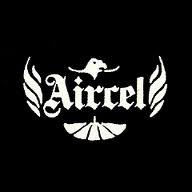 | |
| Former type | Comic publisher |
|---|---|
| Industry | Comics |
| Founded | 1985 |
| Founder(s) | Barry Blair |
| Defunct | 1994 |
| Headquarters | Ottawa, Ontario, Canada |
| Key people | Dave Cooper, Patrick McEown, Guang Yap |
| Owner(s) | Malibu Comics |
Aircel Comics (a.k.a. Aircel Publishing) was a Canadian comic book publisher founded by Barry Blair, based in Ottawa and active between 1985 and 1994. In 1988, it merged with American publisher Eternity Comics, itself an imprint of Malibu Comics, and in the late 1980s was taken over by Malibu before ceasing publication. In the beginning, Aircel focused upon storytlling techniques, blending historical and futuristic fantasy from different cultures as the underlying theme for each comic series. The Aircel comic book "style" featured high-quality colour covers with black-and white interiors. Canadian artists such as Dave Coos Beauvais, and Dale Keown got their start at Aircel.[1] Charles de Lint also scripted several comic books for Aircel in the mid-1980s.
In the late 1980s Aircel terminated its previous comic book series and pursued sex-themed comics in a partnership with Malibu Comics. After 1990, Aircel achieved some commercial success with the Men in Black comic.
Company history[]
Aircel Comics evolved from Aircel Insulation, when the government pulled its contract with the company. Blair, an Aircel employee, convinced the owner to shift the company's focus from insulation to comic book publishing.[1] Aircel's initial talent line-up included Blair, Cooper, Patrick McEown, and Guang Yap.
Releasing their first books in 1985, Samurai, Dragonring, and Elflord, all of which featured line-art manga-styled illustrations, were the first Aircel publications to receive international attention. (Manga was still new to the North American market at the time.)[1] In 1986, illustrator Denis Beauvais collaborated with Blair (as writer) to create Warlock 5, highly regarded among international comic collectors at the time, featuring high-realism mixed-media and airbrushing techniques as a unique trademark style. The Maelstrom series was released shortly thereafter. The first editions and back issues of Aircel publications sold for up to $350 each in Ottawa comic-book stores. Aircel's future, like the strong Canadian arts and music industry of the 1980s, was very promising.
By 1988, however, the independent comics bubble burst,[1] affecting Aircel's niche market. Financial problems caused founder Blair to strike a deal with Scott Mitchell Rosenberg (associated with the American publisher Malibu Comics), whereby Malibu would be "lent" Aircel to publish a number of titles, in return for a financial assist. This resulted in Aircel's de facto merger with the Malibu imprint Eternity Comics.[2] Staff changes at Aircel left their acclaimed original series in uncertainty. New illustrators assumed responsibility for continuing some of the existing series (e.g. Elford vol. 2, Warlock vol. 2). This in turn led to copyright disputes over some of Aircel's titles.[3] Ultimately, Aircel terminated most of its previous titles and pursued sex-themed comics in a partnership with Malibu.
After 1990, Aircel achieved some commercial success with the Men in Black comic. It was first published by Aircel and became a franchise that includes the cartoon Men in Black: The Series, and the movies Men In Black and Men in Black II.
In 1991, Aircel's debts were paid off, and Blair quit Aircel, formally handing the company over to Malibu.[4] Aircel ceased publishing in 1994, when Malibu was bought by Marvel Comics.[5]
Titles published[]
Notes[]
- ↑ 1.0 1.1 1.2 1.3 Munn, Bryan. "Barry Blair, 1959-2010," Sequential: Canadian Comix News & Culture (Jan. 5, 2010).
- ↑ "Eternity Merges with Aircel," The Comics Journal #125 (November 1, 1988), p. 19.
- ↑ "Eternity/Aircel Adventure," The Comics Journal #138 (October 1990), p. 19.
- ↑ "Newswatch: Barry Blair Ends Malibu Contract, Starts Own Firm," The Comics Journal #144 (September 1991), p. 7.
- ↑ Reynolds, Eric. "The Rumors are True: Marvel Buys Malibu," The Comics Journal #173 (December 1994), pp. 29-33.
References[]
- Aircel Comics at the Grand Comics Database
- Aircel Comics at the Comic Book DB

|
This page uses content from Wikipedia. The original article was at Aircel Comics. The list of authors can be seen in the page history. As with Malibu Comics Wiki, the text of Wikipedia is available under the GNU Free Documentation License. |